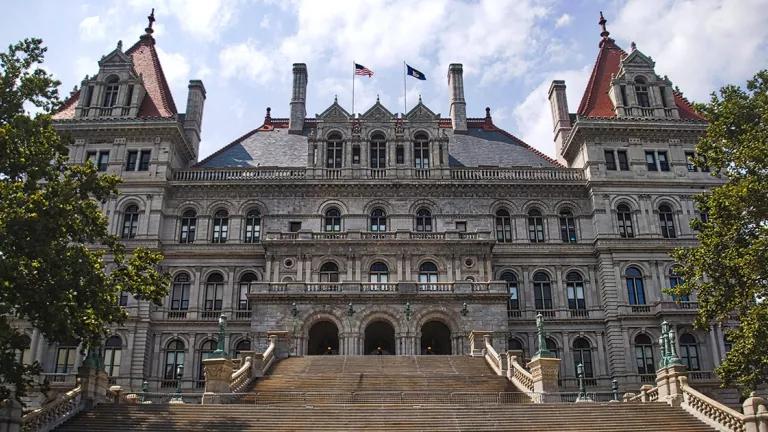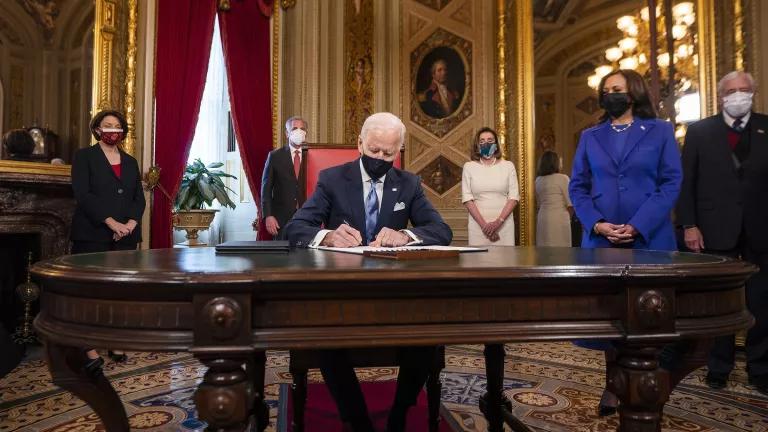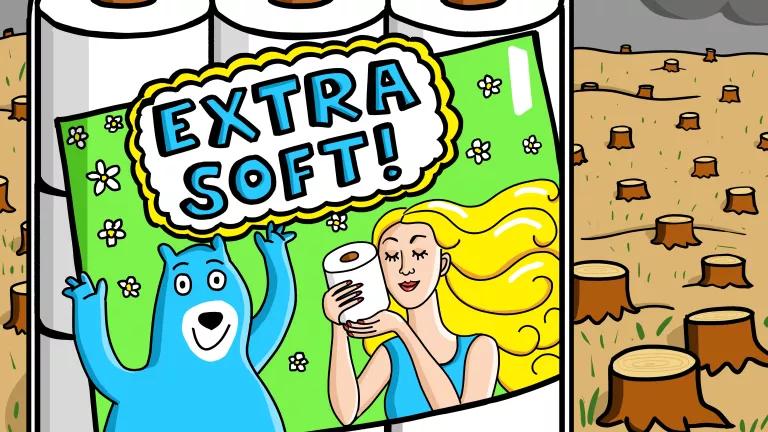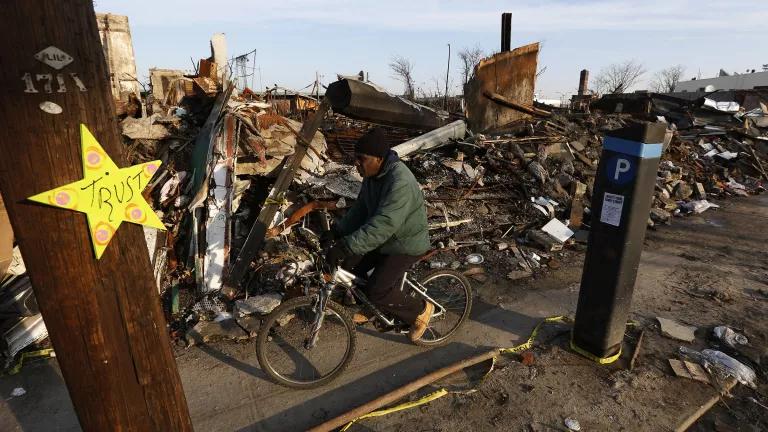Albany Environmental Roundup: 2021 Victories and 2022 Agenda
New York State secured several key environmental and public health victories in 2021—and that momentum is continuing into 2022, as we push for bills to expand the use of electric vehicles, improve energy efficiency, promote food security, and reduce toxic chemicals.

The New York State Capitol building in Albany, New York
This blog was updated on January 11, 2022 and reflects bills that Governor Hochul signed into law in December 2021.
Last year’s legislative session in Albany was unlike any other. Instead of convening in the historic halls of the Capitol, state Senate and Assembly members spent hundreds of hours on video-calls, while a new class of environmentally friendly legislators were sworn in virtually.
But at least as of now, legislators and advocates are scheduled to reconvene in person for the upcoming Albany 2022 Legislative Session that begins in January.
Here is a brief recap of the environmental victories secured in 2021, and some top issues we will be pushing in 2022.
The 2021 Victories
The progress made each year in New York State’s Legislature moves cyclically. While the 2018 session was somewhat unambitious, the 2019 and 2020 sessions produced a cascade of historic policy decisions, elevating New York as a national leader on climate and environmental issues. Most prominently, the 2019 Climate Leadership and Community Protection Act set ambitious New York State climate targets—100% zero-emission electricity by 2040 and an 85% reduction in greenhouse emissions by 2050—while also including a requirement to direct at least 35 to 40% of the program’s benefits to historically disadvantaged communities. Also in 2019, Albany passed bills to adopt a congestion pricing plan, ban offshore oil and gas drilling, and increase food waste recycling.
And a year later, the 2020 state Legislature codified a ban on fracking and ended the use of toxic “forever chemicals” in food containers, while the state Comptroller announced a landmark plan to divest New York’s Common Retirement Fund from fossil fuel companies.
The 2021 session fell somewhere in-between the highs and lows of the last several years.
Key victories include:
Voting YES on the Environmental Rights Amendment
In the November 2021 election, New Yorkers overwhelmingly voted to add a Green Amendment to the New York State Constitution’s Bill of Rights. The New York State Constitution, like the U.S. Constitution, begins with a Bill of Rights that guarantees civil rights and liberties to its residents. This new Green Amendment adds another inalienable right to the State Constitution: that each person “shall have a right to clean air and water, and a healthful environment.” This language is simple yet mighty, enshrining public health and environmental rights on par with other fundamental rights like the right to free speech and freedom of religion. The passage of this ballot measure was no small feat. As Constitutionally required, the Amendment had previously passed two successive Albany legislative sessions, in 2019 and 2021. Looking ahead, it will prove a powerful tool for New Yorkers, and shows that fighting for a healthy environment brings people together. Read more about the Green Amendment.
Barring Utility Shutoffs During the COVID Crisis
New York State passed sweeping protections for residents during the COVID-19 pandemic. Millions of New Yorkers faced financial hardship this year, struggling to pay for the utilities that became more important than ever as people stayed home to protect themselves and others. Utilities like electricity have allowed children to attend school virtually, and water utilities have been necessary for the frequent hand-washing that prevents the spread of the virus. In 2020, New York implemented a statewide moratorium on all utility shutoffs—water, gas, electric, and telephone—so that residents would not lose access to critical services if they missed a bill payment. The moratorium was extended and strengthened in 2021, providing shutoff protections nearly through the end of the year for New Yorkers financially impacted by COVID-19, as well as protection from tax lien sales for municipal water customers who fall behind on their bills. Into 2022, the law continues to expand the availability of extended payment plans for customers in arrears. Read more about the ban on utility shutoffs.
Revving up Clean Cars and Trucks
Transportation is the largest source of greenhouse gas emissions in the state—so increasing the number of clean vehicles on the road is critical to reducing our greenhouse gas emissions and limiting climate change. Thanks to a bill passed last session, by 2035 all new passenger vehicles and trucks sold in-state will be zero-emission. By 2045, the same will be true for mid- and heavy-duty trucks. This bill, signed into law by Governor Hochul in September, makes New York the second state after California to phase out gasoline-powered vehicles, and the first state in the country to codify these rules into law. Read more about the bill to sell only zero-emission vehicles.

An electric vehicle charging station located in a parking lot in Kingston, New York
Banning Toxic Flame-Retardant Chemicals
Under a bill passed by the Legislature in 2021, toxic flame-retardant chemicals will no longer be used in upholstered furniture and mattresses, and organohalogen chemicals will no longer be allowed in the stands and casings of larger electronic displays. These flame-retardant chemicals are associated with serious health effects, including cancer, reproductive harm, learning disabilities, and interference with the normal operation of hormones. Organohalogens, also used to reduce flammability, are man-made chemical compounds that are extremely persistent in the environment and bio-accumulative in nature. When used in household objects, flame-retardant chemicals end up migrating from furniture, mattresses, and electronics into house dust, which people are then exposed to. Firefighters and children face an especially high risk—even though as it turns out, these chemicals are not even needed for fire safety in these products. The bill to ban these toxic chemicals was supported by a wide-ranging coalition—including firefighters, doctors, environmental justice organizations, and business and furniture representatives—and is crucial to protecting public health. The bill was passed last session and signed into law by Governor Hochul on December 31. Read more about the bill to ban flame retardants
Getting Lead Out of School Drinking Water
In a landmark public health victory, New York is poised to significantly lower the allowable lead content in school drinking water. The health impacts of lead exposure can cause serious, irreversible damage, especially to young children. Indeed, there is no safe level of lead exposure. The American Academy of Pediatrics recommends that the maximum level for lead in school drinking water be just 1 part per billion (ppb). But in New York, our action level right now is 15 times higher at 15 ppb. Fortunately, a bill that passed unanimously this session, and was signed into law by the Governor in December, will lower New York’s action level from 15 ppb to 5 ppb and will increase the frequency of water testing, making our state a national leader in protecting children’s health. Read more about the bill to get lead out of school drinking water.

A student filling her water bottle from a drinking fountain at a middle school in the Williamsburg neighborhood of Brooklyn, New York City.
Improving Soil Health and Climate Resiliency on Farms
The Soil Health and Climate Resiliency Act, which passed both houses of the Legislature last session and was just signed into law by the Governor, encourages and supports farmers’ efforts to reduce methane emissions, improve soil health, and maintain water management systems. In doing so, the law can increase soil fertility and farm productivity, build local farmers’ resilience to the impacts of climate change, and mitigate the agricultural sector’s contributions to climate change. Read more on soil health and climate resiliency.
Reducing Plastic Toiletry Waste
Under another bill passed last session, hotels in New York State will take a more sensible approach instead of providing guests with small, throw-away plastic toiletry bottles in every hotel bathroom. These single-use plastic products are responsible for an overwhelming amount of unnecessary waste; tens of millions of single-use plastic bottles cannot be recycled and end up in landfills every year. Hotels can easily replace individual toiletry bottles with environmentally friendly refillable dispensers, making this bill a sensible step toward reducing the ever-growing amount of fossil-fuel based plastic waste generated in our state. The bill was signed into law by the Governor in December. Read more about the bill to phase out single-use plastic toiletry bottles.
2022 Environmental Priorities
Even with these significant achievements, plenty of important bills never passed through the Legislature in 2021. Many of these bills are now top priorities for the upcoming 2022 Session.
Eliminating Tax Breaks for the Fossil Fuel Industry
New York State currently provides the fossil fuel industry over $1.6 billion every year in tax breaks, subsidies, and exemptions. In doing so, we are incentivizing the very industry that fuels the climate crisis—and contradicting the goals of our own 2019 landmark climate law. NRDC is part of a coalition, led by the New York Youth Climate Leaders, advocating for an end to over $330 million of the most egregious non-essential fossil fuel subsidies. As eliminating fossil fuel subsidies gains attention nationwide, ending subsidies in New York State is commonsense. And it would generate substantial funds that could be put to far more responsible use. Read more about eliminating fossil fuel subsidies.
Regulating Climate-Related Insurance Risks
Another top legislative priority for 2022 will be a newly introduced bill to address the link between the insurance industry and the climate crisis. This bill, modeled on a measure passed in Connecticut in June 2021, would direct the Department of Financial Services to regulate the climate risks that domestic insurers’ investments and underwriting decisions pose to the well-being of the state’s insurance market and its communities. This may sound complicated, but the bottom line is that this would be an important bill to align the insurance industry’s investment and underwriting policies with the climate targets of the CLCPA. Read more about climate disclosure.
Green Lighting Green Transportation
Because the transportation sector is our state’s greatest source of greenhouse gas emissions, we must do all that we can to invest in New York’s clean transit future and substantially reduce emissions. NRDC supports a bill that would require public transportation systems across New York State (with the exception of the MTA-run New York City bus system) to purchase only zero-emission electric buses starting in 2029. Additionally, the Green Jobs bill—which complements the Green Transit bill—will also help encourage good, high-quality transportation manufacturing jobs in New York State and will support a just transition. Read more about the Green Transit bill.
We also support the state’s efforts to adopt the Advanced Clean Truck (ACT) rule, which requires that vehicle manufacturers produce an increasing percentage of clean, zero-emission trucks starting in 2024. ACT would meaningfully shift New York’s medium- and heavy-duty truck market away from dirty fossil fuels, cleaning up tailpipe pollution from thousands of trucks on our highways. Read more about the Advanced Clean Truck Rule.
Another bill for next session would make it easier for New Yorkers to purchase electric vehicles across the state. Right now, state law only allows electric vehicles to be sold in five locations and by just one manufacturer. This bill would lift that cap, allowing electric vehicle manufacturers like Rivian, Lucid Motors, and Tesla to directly sell their clean cars to drivers across New York State. Read more about electric vehicle sales.

Electric bus charging stations at Michael J. Quill Bus Depot in the 34 Street-Hudson Yards Subway Station, Manhattan, New York City.
Delivering Clean and Affordable Buildings
As we shift to sustainable energy solutions, it is essential that our state ensures an equitable transition, so that clean energy is accessible and affordable to all New Yorkers—including the energy to heat our homes. The proposed Green Affordable Housing Fund would do just that, financing building electrification and energy efficiency investments in new and existing affordable housing across the state. We encourage New York State to dedicate this funding, and additionally, to establish a target of making at least 2 million homes efficient and all-electric by 2030, with half of those homes being affordable housing units. Read more about the Green Affordable Housing Fund.
Making Household Appliances and Buildings More Energy Efficient
Energy efficiency is the science of achieving the same or better performance while using less energy. Setting standards for energy efficiency is a powerful policy tool with a proven success rate in reducing energy consumption. This upcoming session, we support a bill that would update energy efficiency standards for dozens of residential and commercial products and appliances, including televisions, lamps, water coolers, and air purifiers. The new standards would make these products more efficient, thereby reducing energy and water consumption, curbing carbon emissions, and saving New Yorkers money on energy costs. And products that meet the new efficiency standards are already widely available, due to appliance standards in place put in place by other states.
This same bill would also update efficiency standards for building codes, incorporating greenhouse gas emissions in the scope and design criteria and ensuring that building codes are consistent with the requirements set by the CLCPA. These improved efficiency standards would be a key part of achieving the CLCPA’s energy saving goals, and altogether would save households and businesses in New York State around $1.3 billion every year. Read more about the Advanced Building Codes, Appliance and Equipment Efficiency Standards Act of 2021.
Combatting Food Insecurity with Expanded SNAP Programs
The federal Supplemental Nutrition Assistance Program (SNAP)—formerly “food stamps”—helps tens of millions of people access food. New York State’s SNAP incentive programs build on that foundation, offering additional funds when shoppers use their federal SNAP benefits to buy healthy, local food at farmers markets and other approved locations. We support increasing New York State’s investment in these incentive programs, which offer a win-win-win by strengthening the purchasing power of low-income consumers, increasing the number of families incorporating fresh produce into their meals, and supporting local farmers. Read more about leveraging SNAP incentives.

Corona Farmers Market in Queens, New York City.
Creating a More Sustainable Model for Solid Waste Generation and Disposal
For decades, the amount of waste generated in New York State has continued to grow. On average, New Yorkers discard more than 4.5 pounds of solid waste per person, per day, and that waste ends up in climate-destroying landfills and pollution-generating incinerators that constitute the main disposal routes. Meanwhile, producers of packaging and other consumer goods have had no incentive to reduce waste generated or to manufacture their products using more recycled and recyclable materials. We support a proposed program known as “Extended Producer Responsibility” that would incentivize producers of packaging, paper, and plastics to reduce waste and boost recycling, while covering the costs of municipal recycling programs. Read more about Extended Producer Responsibility.
Protecting Pollinators from Pesticides
Neonicotinoid pesticides or “neonics”—a class of chemicals commonly used in lawncare and corn and soybean fields—have proven devastating to birds and bees. Neonics have been linked with massive losses of bees and other pollinators critical to food production and ecosystems, as well as to losses of birds, the collapse of fisheries, and birth defects in white-tailed deer. What’s more, neonics may be harmful to people too; research now shows that neonic exposures may lead to elevated risk of developmental or neurological damage and other health complications—especially in children and pregnant women. An important bill this session would eliminate the low-to-no benefit neonic uses that account for the vast majority of neonics entering the state’s environment, protecting people and pollinators alike. Read more about the Birds and Bees Protection Act.
Halting New Fossil Fuel Infrastructure
Outside of the Legislature, NRDC is also working to prevent the construction of pipelines and other new, unnecessary fossil fuel infrastructure in the region. One top fight is against a proposed liquified natural gas (LNG) export terminal in Gibbstown, NJ, which would be the first such facility on the Delaware River. In addition to accelerating the climate crisis, the Gibbstown facility threatens chemical contamination of the waterbody that provides drinking water to 15 million people and would require highly explosive LNG to be transported through communities near Philadelphia, PA and Camden, NJ by truck and train. Along with the Delaware Riverkeeper Network, FrackAction, Catskill Mountainkeeper, and others, we are campaigning to prevent the Gibbstown terminal from being built. Following the recent cancellation of the PennEast Pipeline—a dangerous 120-mile long pipeline that would have carried fracked shale gas from northeast Pennsylvania across the Delaware—we hope that the Gibbstown facility can likewise be scrapped. Read more about our efforts to stop the proposed Gibbstown project.

Delaware Water Gap
The 2022 agenda will grow as new, important bills are advanced. And it critical to close the door on the several bills still waiting for the Governor’s final signature. At the same time, we should also take stock of the impressive number of environmental legislative successes New York has secured this past session and over the last several years. These victories are important not only in of themselves—they also provide momentum and hope for New Yorkers to keep fighting for a green future. As New Yorkers feel the impacts of global climate change, it is profoundly urgent that we do everything in our power to protect our planet and our neighbors.
Online or in-person, NRDC and our partners’ advocacy continues fiercely to protect our natural resources, our neighbors, and our planet.



